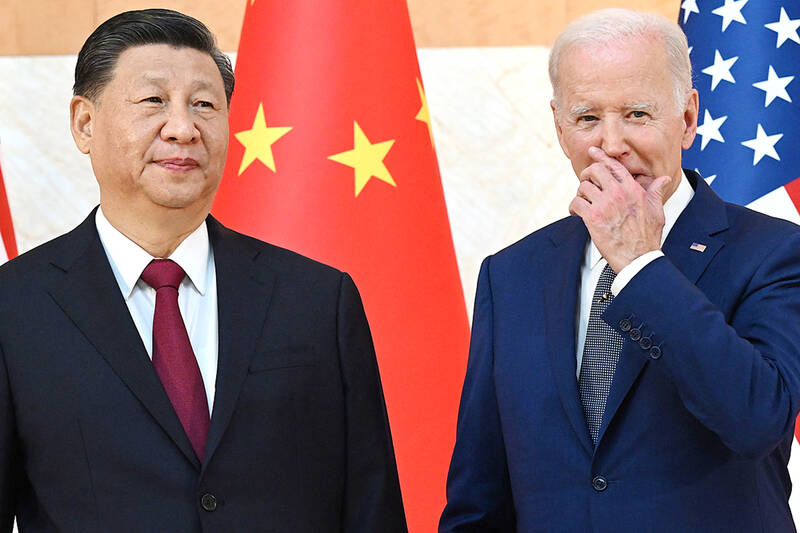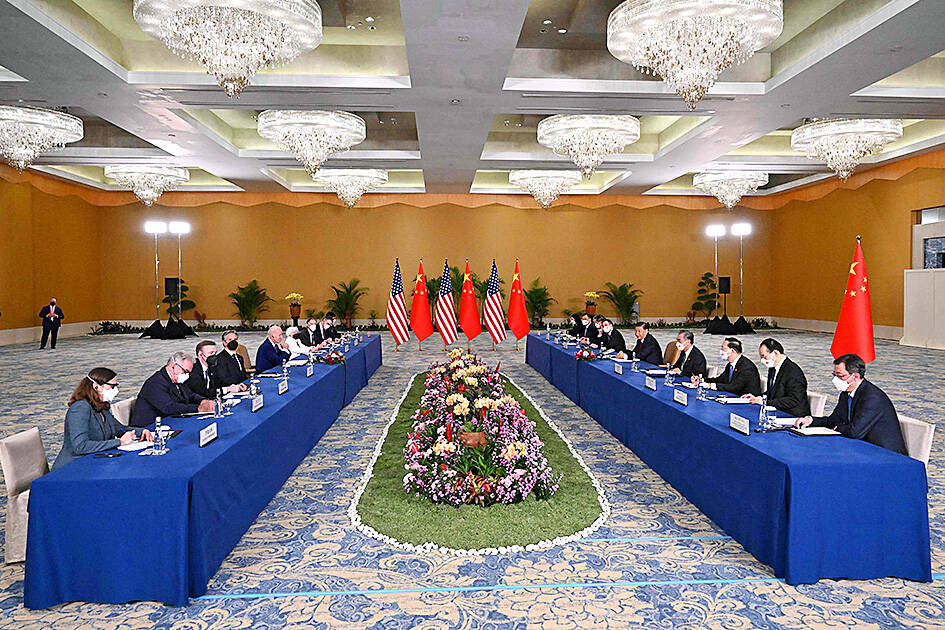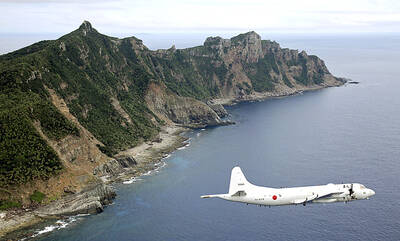US President Joe Biden yesterday objected to China’s “coercive and increasingly aggressive actions” toward Taiwan, and raised human rights concerns about Beijing’s conduct in Xinjiang, Tibet and Hong Kong during his first in-person meeting with Chinese President Xi Jinping (習近平) since he took office, the White House said.
In Taipei, Presidential Office spokesman Xavier Chang (張惇涵) said last night that Taiwan was glad to see Biden reiterate the US’ opposition to unilaterally changing the “status quo” in the Taiwan Strait.
Taiwan will continue its efforts to uphold regional stability and peace with like-minded partners, he added.

Photo: AFP
In a statement after the roughly three-hour session, the White House said Biden told Xi that the US would “continue to compete vigorously” with China, but that “competition should not veer into conflict.”
The meeting came as the superpowers aimed to “manage” differences between them as they compete for global influence amid increasing economic and security tensions.
Biden scheduled a news conference later yesterday to discuss the meeting, which came in the midst of a seven-day, round-the-world trip.

Photo: AFP
Biden and Xi also agreed that “a nuclear war should never be fought” and cannot be won, “and underscored their opposition to the use or threat of use of nuclear weapons in Ukraine,” the White House said.
That was a reference to Russian officials’ thinly veiled threats to use atomic weapons as its nearly nine-month invasion of Ukraine has faltered.
Biden and Xi also agreed to “empower key senior officials” on areas of potential cooperation, including tacking climate change, and maintaining global financial, health and food stability.
It was not immediately clear whether that meant China would agree to restart climate change talks that Beijing had paused in protest of US House of Representatives Speaker Nancy Pelosi’s visit to Taiwan in August.
Xi and Biden greeted each other with a handshake at a luxury resort hotel in Indonesia, where they are attending the G20 summit of large economies.
“As the leaders of our two nations, we share responsibility, in my view, to show that China and the United States can manage our differences, prevent competition from becoming anything ever near conflict, and to find ways to work together on urgent global issues that require our mutual cooperation,” Biden said to open the meeting.
Xi called on Biden to “chart the right course” and “elevate the relationship” between China and the US.
He said he was ready for a “candid and in-depth exchange of views” with Biden.
Both men entered the highly anticipated meeting with bolstered political standing at home. Democrats triumphantly held onto control of the US Senate, with a chance to boost their ranks by one in a runoff election in Georgia next month, while Xi was awarded a third five-year term last month by the Chinese Communist Party’s National Congress.
The White House said Biden specifically mentioned US concerns about China’s actions in Xinjiang, Tibet and Hong Kong, and the plight of Americans it considers “wrongfully detained” or subject to exit bans in China.
It said Biden “raised US objections to the PRC’s [People’s Republic of China’s] coercive and increasingly aggressive actions toward Taiwan, which undermine peace and stability across the Taiwan Strait and in the broader region, and jeopardize global prosperity.”
Xi, according to the Chinese government’s own account of the meeting, “stressed that the Taiwan question is at the very core of China’s core interests, the bedrock of the political foundation of China-US relations, and the first red line that must not be crossed in China-US relations.”
In the meeting, Biden said China’s economic practices “harm American workers and families, and workers and families around the world,” the White House said.
It came just weeks after the Biden administration blocked exports of advanced computer chips to China — a national security move that bolsters US competition against Beijing.

MISINFORMATION: The generated content tends to adopt China’s official stance, such as ‘Taiwan is currently governed by the Chinese central government,’ the NSB said Five China-developed artificial intelligence (AI) language models exhibit cybersecurity risks and content biases, an inspection conducted by the National Security Bureau (NSB) showed. The five AI tools are: DeepSeek, Doubao (豆包), Yiyan (文心一言), Tongyi (通義千問) and Yuanbao (騰訊元寶), the bureau said, advising people to remain vigilant to protect personal data privacy and corporate business secrets. The NSB said it, in accordance with the National Intelligence Services Act (國家情報工作法), has reviewed international cybersecurity reports and intelligence, and coordinated with the Ministry of Justice Investigation Bureau and the National Police Agency’s Criminal Investigation Bureau to conduct an inspection of China-made AI language

BOOST IN CONFIDENCE: The sale sends a clear message of support for Taiwan and dispels rumors that US President Donald Trump ‘sold out’ the nation, an expert said The US government on Thursday announced a possible sale to Taiwan of fighter jet parts, which was estimated to cost about US$330 million, in a move that an expert said “sends a clear message of support for Taiwan” amid fears that Washington might be wavering in its attitude toward Taipei. It was the first announcement of an arms sale to Taiwan since US President Donald Trump returned to the White House earlier this year. The proposed package includes non-standard components, spare and repair parts, consumables and accessories, as well repair and return support for the F-16, C-130 and Indigenous Defense Fighter aircraft,

CHECKING BOUNDARIES: China wants to disrupt solidarity among democracies and test their red lines, but it is instead pushing nations to become more united, an expert said The US Department of State on Friday expressed deep concern over a Chinese public security agency’s investigation into Legislator Puma Shen (沈伯洋) for “secession.” “China’s actions threaten free speech and erode norms that have underpinned the cross-strait ‘status quo’ for decades,” a US Department of State spokesperson said. The Chongqing Municipal Public Security Bureau late last month listed Shen as “wanted” and launched an investigation into alleged “secession-related” criminal activities, including his founding of the Kuma Academy, a civil defense organization that prepares people for an invasion by China. The spokesperson said that the US was “deeply concerned” about the bureau investigating Shen

DISPUTE: A Chinese official prompted a formal protest from Tokyo by saying that ‘the dirty head that sticks itself out must be cut off,’ after Takaichi’s Taiwan remarks Four armed China Coast Guard vessels yesterday morning sailed through disputed waters controlled by Japan, amid a diplomatic spat following Japanese Prime Minister Sanae Takaichi’s comments on Taiwan. The four ships sailed around the Senkaku Islands — known as the Diaoyutai Islands (釣魚台) to Taiwan, and which Taiwan and China also claim — on Saturday before entering Japanese waters yesterday and left, the Japan Coast Guard said. The China Coast Guard said in a statement that it carried out a “rights enforcement patrol” through the waters and that it was a lawful operation. As of the end of last month,